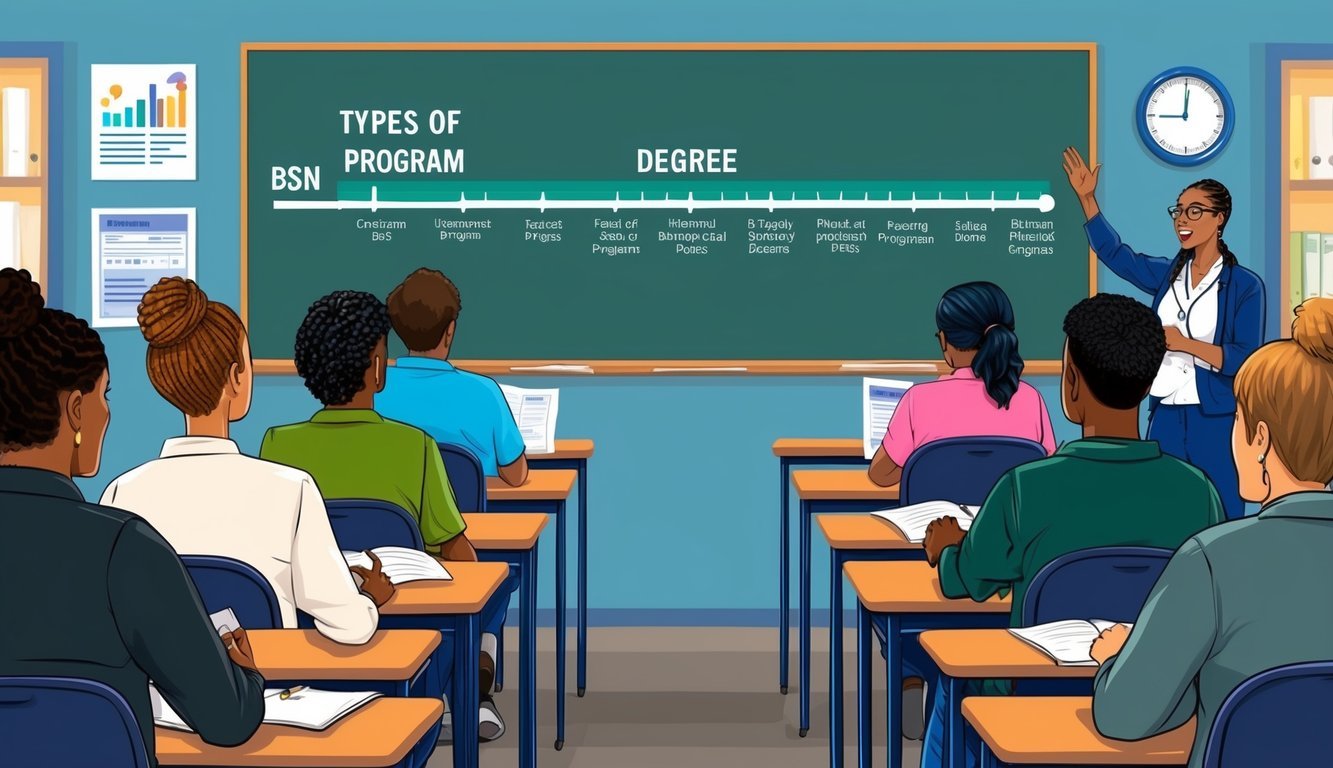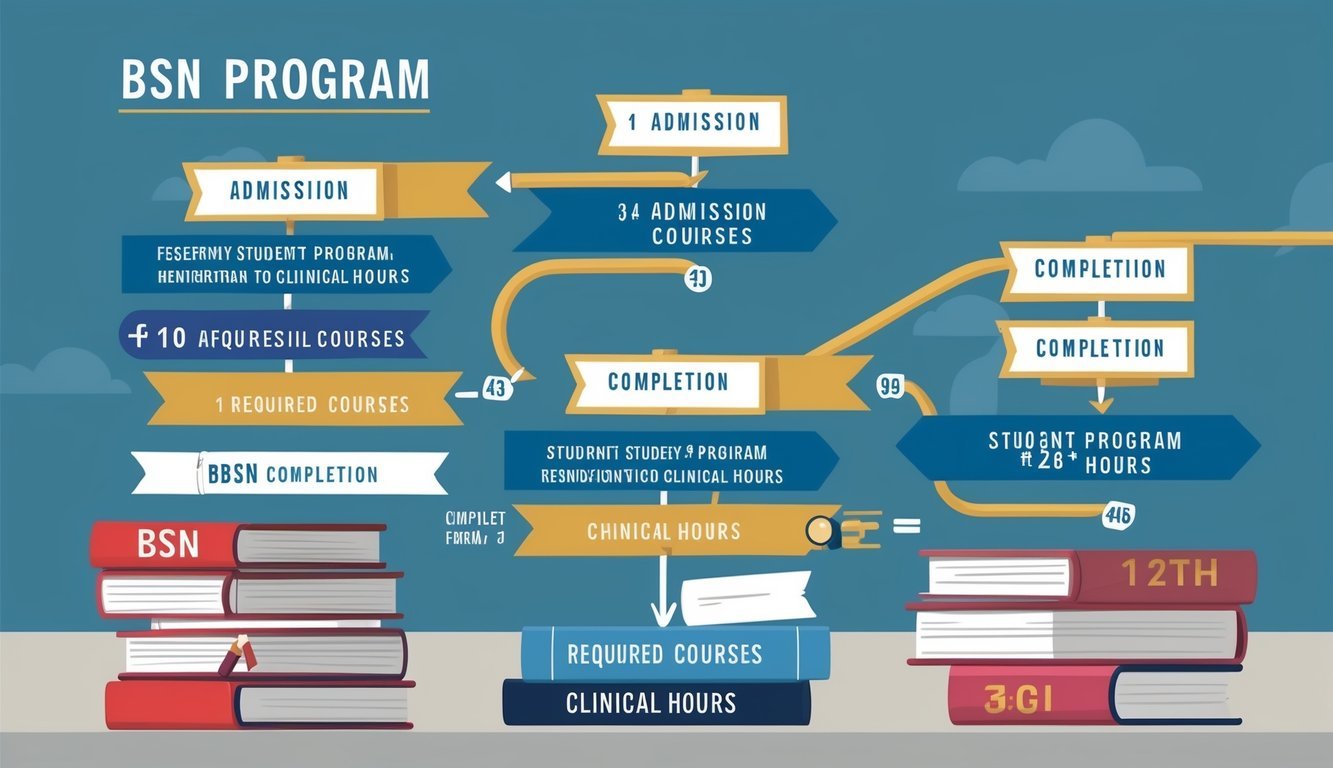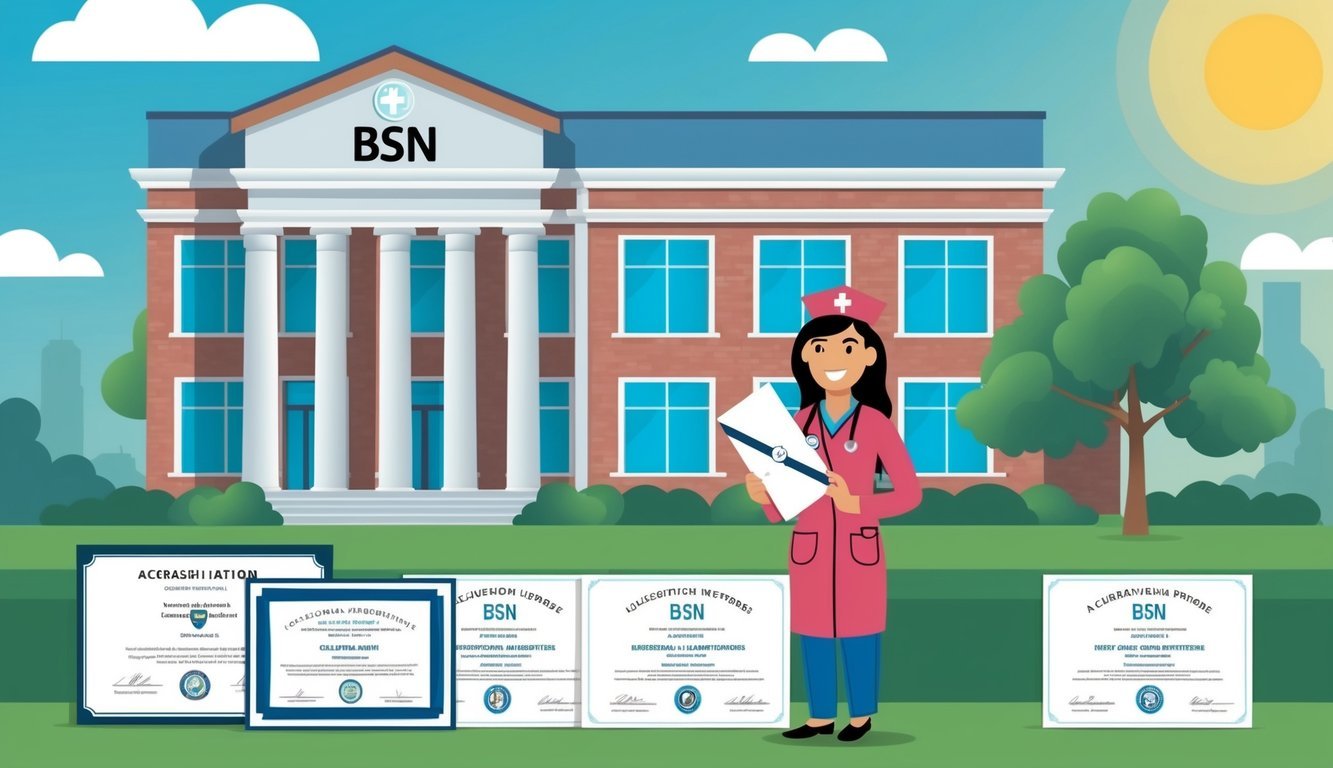Obtaining a Bachelor of Science in Nursing (BSN) is a significant step toward advancing your nursing career. Traditional BSN programs typically take about four years to complete.
However, if you already hold a bachelor’s degree in another field, accelerated programs can allow you to earn your BSN in as little as 12 to 18 months.
This flexibility can make a considerable difference in your journey to becoming a registered nurse.
As a nursing professional, having a BSN can enhance your qualifications and open doors to better job opportunities, leadership roles, and higher salaries.
Nursing education plays a pivotal role in your development and can significantly impact the quality of care you provide to patients. Consider exploring various programs to find one that best fits your schedule and career aspirations.
If you’re ready to take the next step in your nursing journey, understanding the timeline and options for a BSN can provide clarity as you make your decision.
There are numerous resources available to help guide you through this process, such as NurseJournal and Nurse.org.
Types of BSN Programs

When pursuing a Bachelor of Science in Nursing (BSN), several program types fit different educational backgrounds and career goals.
Here are the most common options:
| BSN Program Type | Description | Duration |
|---|---|---|
| Traditional BSN | Designed for students entering the nursing field. Typically requires a high school diploma. | 4 years |
| Accelerated BSN | For those with a bachelor’s degree in another field. Intensive coursework to earn a BSN quickly. | 12 to 18 months |
| Online RN-to-BSN | Designed for registered nurses holding an ADN. Offers flexible scheduling and online coursework. | 1 to 2 years |
| RN-to-BSN Program | Similar to the online RN-to-BSN but may include hybrid structures with some in-person classes. | 1 to 2 years |
| Bridge Programs | Transition programs that help entry-level nurses move to higher educational levels efficiently. | Variable, depending on the program |
Each program has unique admission requirements and can lead to different career opportunities.
You can explore more about these options and compare specific programs through resources like Nurse.org and NurseJournal.org.
Curriculum and Learning Outcomes
The curriculum for a Bachelor of Science in Nursing (BSN) program is designed to equip you with the essential knowledge and skills needed for effective nursing practice.
This includes a combination of general education, core nursing courses, and specialized training, along with clinical experience that is crucial for hands-on patient care.
General Education and Core Nursing Courses
Your BSN journey begins with general education courses that build a solid academic foundation.
These typically include subjects like Chemistry, Microbiology, and Anatomy and Physiology.
Such courses are vital because they provide the scientific knowledge necessary to understand human biology and disease processes.
In addition to these foundational subjects, you will take core nursing courses that focus on nursing theory and basic patient care.
These courses emphasize critical thinking and informatics, teaching you to analyze patient data effectively.
The integration of theory with practice ensures that you are prepared to apply your knowledge in real-world healthcare settings.
Specialized Nursing Courses and Clinical Experience
As you progress, specialized nursing courses become integral to your education.
These classes may cover Community Health, nursing ethics, and advanced patient care techniques.
Through these specialized subjects, you dive deeper into complex health issues and learn to cater to diverse patient populations.
Clinical experience is a significant component of your BSN program, often requiring you to complete a set number of clinical hours.
This hands-on training allows you to apply theoretical knowledge in healthcare environments under professional supervision.
You will gain invaluable skills in patient assessment and care while working in various settings, ultimately preparing you for the challenges of modern nursing practice.
BSN Program Admissions and Progression

Understanding the admission process and progression for a Bachelor of Science in Nursing (BSN) program is crucial for prospective students.
The requirements can vary among institutions, so being informed will help you navigate your options effectively.
Admission Requirements
To gain admission into a BSN program, you typically need to meet specific criteria.
Most programs require a high school diploma or equivalent, along with a minimum GPA—usually around 2.5 to 3.0 on a 4.0 scale.
Standard admission requirements may include:
- Prerequisite courses: Subjects like biology, chemistry, and algebra.
- Entrance exams: Some programs may require scores from tests like the TEAS or HESI.
- Personal statement or essay: This is often required to assess your motivation and commitment to nursing.
- Interviews: An interview may be part of the process for some schools.
Transfer Credits and Coursework
If you have prior college experience, you may be able to transfer credits into your BSN program.
Each institution has its own policy regarding accepted transfer credits, which may impact your course load and program length.
Key points to consider include:
- General education requirements: Commonly include courses in humanities, social sciences, and natural sciences.
- Nursing-specific coursework: Expect to complete courses like pharmacology, nursing ethics, and clinical practices.
Check with your prospective school regarding their transfer credit process and what courses can be applied to your BSN program.
This can significantly reduce the time it takes to complete your degree if you already have relevant credits.
For detailed information about specific programs, visit resources like NurseJournal.org and NursingProcess.org.
Impact on Career and Professional Practice

Pursuing a Bachelor of Science in Nursing (BSN) significantly influences your career path and professional practice.
It opens doors to leadership roles, enhances your earning potential, and provides access to advanced practice opportunities.
Leadership and Advancement Opportunities
With a BSN, you are equipped for leadership roles that influence patient care and healthcare policies.
Many healthcare organizations, especially Magnet hospitals, prioritize hiring BSN-prepared nurses for management positions.
A BSN degree prepares you for roles like Nurse Manager or Clinical Nurse Leader, where you can drive quality improvement initiatives.
Pursuing advanced degrees, such as a Master of Science in Nursing (MSN) or Doctor of Nursing Practice (DNP), becomes more accessible, allowing you to expand your career further into areas like nursing education or healthcare administration.
Higher Earning Potential and Job Opportunities
The earning potential for BSN-prepared nurses is notably higher than that for Associate Degree in Nursing (ADN) holders.
For instance, BSN nurses can earn nearly $20,000 more annually compared to their ADN counterparts.
| Degree Level | Average Annual Salary |
|---|---|
| ADN | $77,000 |
| BSN | $94,000 |
This salary advancement can increase even further when you pursue specializations or advanced degrees.
Additionally, job opportunities expand as many employers prefer or require a BSN for new hires, especially in competitive job markets.
Specializations and Higher Education
Obtaining a BSN allows you to explore various nursing specializations that may not be available to those with only an ADN.
You can pursue certifications in areas such as pediatrics, gerontology, or critical care nursing.
Moreover, a BSN is often the first step toward pursuing higher education.
Advanced certifications or degrees lead to roles such as an Advanced Practice Registered Nurse (APRN), where you can have a significant impact on patient outcomes.
Specialized training can also position you for roles in clinical research or healthcare leadership.
Your commitment to further education and specialization can enhance your contributions to the nursing profession and improve patient care.
Licensure, Accreditation, and Continuing Education

Understanding licensure, accreditation, and ongoing education is essential for your nursing career.
These components ensure that you are qualified, capable, and up-to-date with industry standards.
Accrediting Bodies and Program Evaluation
Accreditation plays a critical role in nursing education.
It ensures that programs meet specific standards set by recognized organizations.
Major accrediting bodies include the Accreditation Commission for Education in Nursing (ACEN) and the Commission on Collegiate Nursing Education (CCNE).
These organizations evaluate programs based on criteria such as curriculum quality, faculty qualifications, and student outcomes.
Graduating from an accredited program is crucial because it can impact your eligibility for RN licensure and your employment prospects. When choosing a BSN program, confirm its accreditation status to ensure a quality education that aligns with industry expectations.
NCLEX-RN Exam and RN Licensure
After completing your BSN, you must pass the NCLEX-RN Exam to obtain your RN licensure.
This computer-adaptive test assesses your nursing knowledge and skills through various scenarios.
Resources like the National Council of State Boards of Nursing (NCSBN) provide essential information on the exam format and content.
To qualify for the exam, you must apply through your state’s nursing board.
Eligibility requirements can vary, so it’s essential to review your state’s specific regulations.
Once you pass the NCLEX-RN, you will receive your RN license, allowing you to practice nursing professionally.
Ongoing Education and Certifications
Nursing is a dynamic field that requires ongoing education.
Many states require nurses to earn continuing education credits for license renewal.
They usually need to do this every 2 to 5 years.
Participating in ongoing education keeps your skills current.
This may involve workshops, seminars, or online courses.
Pursuing specialty certifications can also enhance your qualifications.
The American Nurses Credentialing Center (ANCC) and National League for Nursing (NLN) offer various certification programs.
These certifications not only improve your knowledge but also demonstrate your commitment to professional growth.
Engaging in continuing education and obtaining certifications can lead to better career opportunities and increased earning potential.

